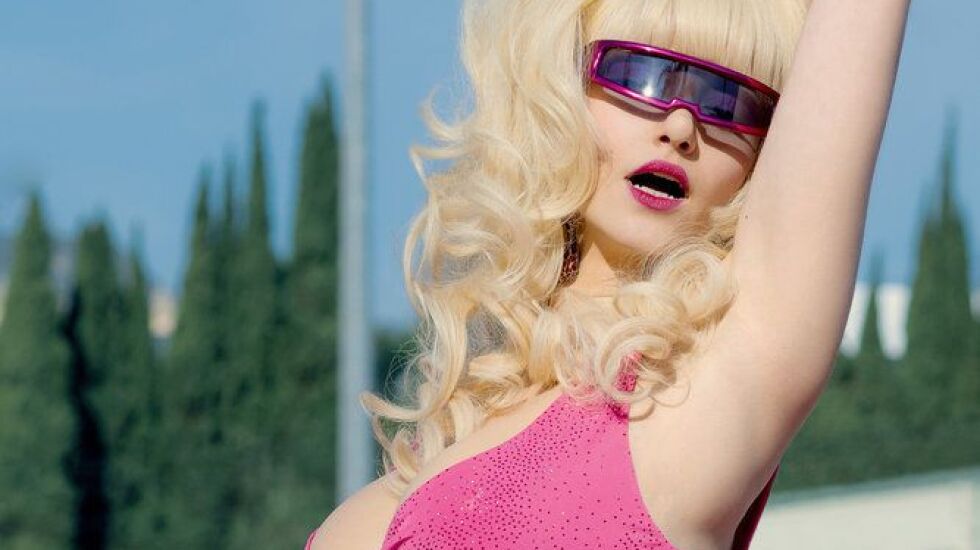
Half the celebrities in the world today are famous for being famous—although I guess many of them actually DO have talent, ranging from the ability to dance suggestively in yoga pants on TikTok to saying stupid things on YouTube to getting plastic surgery and yelling at each other on “reality” TV to setting up pay-as-you-play accounts that are for fans only. These are skill sets, people!
Not that this is anything new; some 60 years ago the historian Daniel J. Boorstin published “The Image: A Guide to Pseudo-Events in America,” in which he defined celebrity as “a person who is known for his well-knownness.”From Zsa Zsa Gabor to Paris Hilton and the Kardashians, there’s a long and shallow history of inexplicably well-known individuals—and one of the undisputed pioneers in that field is the cartoonishly busty, sugary blonde, pink Corvette-driving phenomenon known as Angelyne, who burst onto the Los Angeles landscape with a series of billboards in the 1980s and somehow became something of an icon, despite the fact that was pretty much it: the billboards.
Now her story gets the limited series, “based-on-a-true-story but certain events have been fictionalized” treatment in the wicked smart, cleverly meta, whimsical and yet occasionally melancholy “Angelyne” on Peacock, with Emmy Rossum (who also serves as one of the executive producers) delivering a sparkling and splashy and yet honest and authentic performance as a woman who willed herself into becoming a Hollywood icon—and on some level, that truly IS a talent.
Told in the style of a mockumentary, with Angelyne and others giving “interviews” straight to camera, and also employing the occasional “I, Tonya” technique of characters breaking the fourth wall to dispute or comment on events, the series is based in part on Gary Baum’s 2017 article for the Hollywood Reporter that exposed the true story behind the billboard mythology—but it’s a stylized, dreamy, sometimes appropriately trippy and frothy mix of established facts and flights of fancy. ALL the narrators in “Angelyne” are unreliable.
Showrunner Allison Miller and the crack writing team deliver a fast-paced, time-jumping, consistently witty and sharp fractured fairy tale, filled with pink-on-pink-on-pink visuals and set to the lush pop sounds of the Electric Light Orchestra, among others.
Rossum disappears under a tsunami of blonde wig, extensive makeup and prosthetics and breathless voice as she becomes Angelyne, first seen as an ambitious and self-promoting wannabe punk singer in the 1970s.(Her reaction to a scathing review is pure joy; her name is in the paper, she’s becoming famous!)
Each episode frames Angelyne’s story through her point of view and the experiences of pivotal individuals in her life, including Harold Wallach (Martin Freeman), the L.A. printing mogul who financed Angelyne’s billboards in the 1980s; Rick Krause (Hamish Linklater), the bizarro and slavishly devoted president of Angelyne’s fan club; Max Allen (Lukas Gage), who tried for years to make a documentary about Angelyne, and Jeff Glaser (Alex Karpovsky) as a fictionalized version of reporter Gary Baum.
We see evidence of Angelyne’s business acumen when she parlays one billboard into dozens, all the while adding to her legend by tooling around Los Angeles in a pink Corvette, much to the delight of tourists and locals who are thrilled to catch a glimpse of—and buy some merchandise from—a real Hollywood star.
Yet that’s the thing: Despite all the billboards and the talk show appearances and the blink-and-you’ll-miss-her guest spots on TV and in the movies, Angelyne was just … Angelyne. (The Los Angeles Times once noted her billboards “have had a better career than she has, appearing in ‘Get Shorty’ and ‘Volcano’ as well as TV’s ‘The Simpsons,’ ‘Moonlighting’ and ‘Futurama.’ ”)
Rossum does a beautiful job of conveying the sadness and insecurity in Angelyne’s eyes, even as she indulges her narcissism and manipulates the men in her life to the benefit of her own career. There’s a poignant scene when Wallach’s grown daughter (Molly Ephraim), who deeply resents Angelyne for turning her father’s world upside down, sees Angelyne in the parking lot of a grocery store and is ready to confront her—but softens when she sees the run in Angelyne’s stockings and the rather depressing spectacle of this no-longer-young woman in full makeup and wardrobe, loading paper bags of groceries into her car.
Not that we ever get to see the “real” Angelyne, the woman who comes home after a long day of driving around town and selling magazines, photos and other trinkets out of her car trunk, takes off the wig and the makeup and turns off the persona. That’s the point, really; Even after the details of Angelyne’s upbringing and personal life are revealed in the article, she just keeps on going as Angelyne, as if that other person doesn’t exist and never existed. There’s something a little bit Hollywood-magical and a little bit sad about that. Thanks in large part to Rossum’s deeply sympathetic and almost protective performance, “Angelyne” turns Angelyne into the kind of star she always wanted to be.







